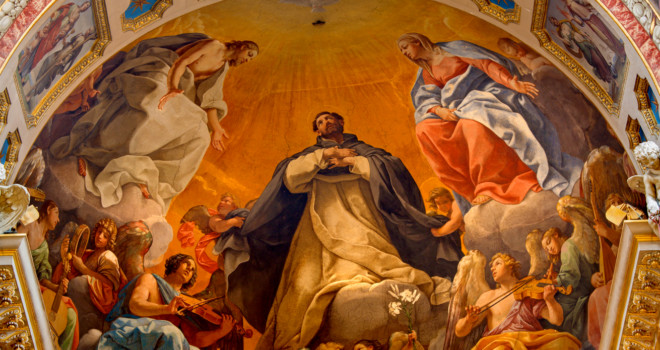Lay people do well to learn from the spiritualities, charisms, and lifestyles of the great religious orders, and the summer months host the feast days of some of those great religious orders—one of them being today, August 8th, the feast of St. Dominic de Guzman.
St. Dominic founded the Order of Preachers, also known as the Dominicans. Whether or not we are professed in the religious order, incorporating at least a few elements of Dominican life and spirituality will help each of us answer the universal call to holiness and bring the grace of Jesus Christ into the world.
The Three Pillars
For our purposes here, the pillars of Dominican spirituality fall into three categories: contemplative, liturgical, and apostolic. Dominicans receive the divine life in their contemplation of God and His creation; they bring order to their lives and the world by their rich participation in the Church’s liturgy; and they give away the divine life that they have received in contemplation and liturgy by engaging in robust and fruitful apostolic works. Essentially, the charism of all Dominicans is to hand on the fruits of their contemplation through preaching.
The Contemplative Life
Dominican life is contemplative; they prioritize seeking and pondering the face of God. Indeed, this can happen in private, meditative prayer, but it also happens in study. Note the history of incredible scholars produced by the order, such as St. Albert the Great, St. Thomas Aquinas, and many modern friars. Dominicans know that it is impossible to love God more by remaining at the same level of knowledge. More than that, Dominicans provide us with a great example of finding ways to know more about God by encountering Him in various settings. The laity can take inspiration from this pillar of the order’s spirituality by seeking God’s face in every moment, encounter, and environment, too.
The Liturgical Life
Dominican life is liturgical as well. This pillar of the order’s spiritual life works hand-in-hand with contemplation. We might encounter God deeply and contemplate His face within or immediately following the liturgy. We also may feel that we want to turn and give thanks and praise to God after a profound experience of deep truth in contemplation. The liturgy, especially the Mass, is the best place for that.
In addition to entering fully into Mass, there are two simple ways that we laity might grow through Dominican spirituality. The first is by reciting some portion (or all) of the Liturgy of the Hours, the official prayer of the Church, each day. The Divine Office, as it is also called, is a prayer that brings order to the days of individuals and communities. It can help laity, including families, find the order that they seek by praying at specific times throughout the day.
At the end of Night Prayer each day, those who recite the hours pray the Salve Regina (Hail, Holy Queen, in English). Even if laity can’t pray any of the hours throughout the day or night, it would be a good liturgical and Dominican practice to pray the Salve right before retiring to bed for the night. This helps incorporate the Marian element of Dominican spirituality which, of course, is centered on the Rosary (given by Our Lady to St. Dominic in 1214).
The Apostolic Life
Whether it be centered on the Mass, the Rosary, private prayer, or all three, the contemplative and liturgical life of Dominicans is all ordered toward an outward expression. Once we have contemplated the face of Jesus, we are impelled to action. In addition to being marked by prayer, study, and liturgy, Dominican life is apostolic. Remember, the charism of Dominicans is to share the fruit of their contemplation with others. This is specifically why Dominicans are known as preachers. For centuries, the sons and daughters of St. Dominic have preached and helped others have experiences of God in liturgy, retreats, and school classrooms.
Preaching, though, is not simply about lively words spoken from a pulpit or taught in front of students. Dominicans understand that preaching can happen with actions also. So, apostolic ministry and the works of mercy are just as much preaching as a powerful homily. Even though many laity don’t have the opportunity to give inspiring speeches very often, they can participate in the apostolic pillar in silent ways, such as the list that Jesus gives to us in Matthew 25.
These works of mercy are how the laity can and should give away the fruits of their own contemplation. Brother Carlos Aspiroz Costa, who succeeded Dominic as leader of the order, noted as much when he said that “hands are a projection of what is in our heart.” If the Dominican regimen has made us strong, and if meditative and contemplative prayer have brought us into deep union with the Lord, then we will naturally be ready to go out and share the good news through the corporal works of mercy. (We practice many of the spiritual works of mercy while we’re in prayer).
Responding to the Call to Holiness
Each of the qualities above can be woven into the lives of laity; they are not only for the consecrated religious. If we learn to live these practices, we will be answering the universal call to holiness. In addition to that, they will help our lives become infinitely more ordered and joyful by adjoining us to the Infinite.
Editor’s Note: For more on identifying ways that laity can benefit from the spiritualities of venerable religious orders, visit Rotty’s other articles here and here.










